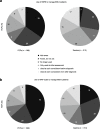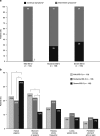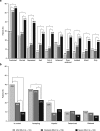Impact of symptom severity in patients with diarrhoea-predominant irritable bowel syndrome (IBS-D): results from two separate surveys of HCPs and patients with IBS-D
- PMID: 32336287
- PMCID: PMC7183708
- DOI: 10.1186/s12876-020-01252-9
Impact of symptom severity in patients with diarrhoea-predominant irritable bowel syndrome (IBS-D): results from two separate surveys of HCPs and patients with IBS-D
Abstract
Background: Management of diarrhoea-predominant irritable bowel syndrome (IBS-D) is generally based on patient-reported symptoms; however, limited information on symptom severity exists. The objective of the study was to assess the impact of IBS-D severity on patient burden and patient and healthcare professional attitudes towards IBS.
Methods: We conducted two web-based surveys of healthcare professionals and patients from Australia, Canada and Europe. We analysed patient characteristics and attitudes by IBS-D severity, which was assessed retrospectively using a composite of four variables: worst abdominal pain, IBS symptom frequency, Bristol Stool Form Scale and quality of life.
Results: Of 679 healthcare professional respondents, one-third routinely classified patients by severity. The patient survey was completed by 513 patients with mild (26%), moderate (33%) and severe (41%) IBS-D, classified using the composite scale. Age, sex and treatment satisfaction did not change with severity; however, 19% of patients classified with severe IBS-D agreed with the statement: 'When my IBS is bad, I wish I was dead' versus 4 and 7% of patients with mild and moderate IBS-D, respectively (p < 0.05). Significantly more patients classified with severe IBS-D reported medication use versus mild IBS-D.
Conclusion: Compared with milder symptoms, severe IBS-D was associated with increased medication use and a negative perspective of IBS-D. This highlights the need for a validated severity scale to inform treatment decisions.
Keywords: Diarrhoea-predominant irritable bowel syndrome; Gastrointestinal symptom rating scale; IBS; Outcomes research; Patient-reported outcomes.
Conflict of interest statement
AE is supported by the UCL/UCLH Biomedical Research Centre and has served on advisory boards for Allergan plc, Almirall, Shire and Takeda. RWG is an employee of Kantar Health, which received study funding from Allergan plc. GW is a former employee of Allergan plc. SB is an employee of Allergan plc. HT has served on advisory boards for Almirall, Allergan plc and Shire, and has acted as a speaker for Shire, Allergan plc, Almirall and Tillotts.
Figures




Similar articles
-
Efficacy and mode of action of mesalazine in the treatment of diarrhoea-predominant irritable bowel syndrome (IBS-D): study protocol for a randomised controlled trial.Trials. 2013 Jan 9;14:10. doi: 10.1186/1745-6215-14-10. Trials. 2013. PMID: 23302220 Free PMC article. Clinical Trial.
-
Comparison of Symptoms, Healthcare Utilization, and Treatment in Diagnosed and Undiagnosed Individuals With Diarrhea-Predominant Irritable Bowel Syndrome.Am J Gastroenterol. 2017 Jun;112(6):892-899. doi: 10.1038/ajg.2016.574. Epub 2017 Jan 17. Am J Gastroenterol. 2017. PMID: 28094313 Free PMC article.
-
Discriminant and convergent validity of the GSRS-IBS symptom severity measure for irritable bowel syndrome: A population study.United European Gastroenterol J. 2020 Apr;8(3):284-292. doi: 10.1177/2050640619900577. Epub 2020 Jan 14. United European Gastroenterol J. 2020. PMID: 32213021 Free PMC article.
-
Alosetron for severe diarrhea-predominant irritable bowel syndrome: improving patient outcomes.Curr Med Res Opin. 2011 Mar;27(3):503-12. doi: 10.1185/03007995.2010.547933. Epub 2011 Jan 6. Curr Med Res Opin. 2011. PMID: 21208139 Review.
-
Evidence-based management of irritable bowel syndrome with diarrhea.Am J Manag Care. 2018 Jan;24(3 Suppl):S35-S46. Am J Manag Care. 2018. PMID: 29372991 Review.
Cited by
-
Effectiveness of Group Emotional Schema Therapy on Psychological Distress, Severity and Frequency of Symptoms in Women with Irritable Bowel Syndrome.Adv Biomed Res. 2024 Jan 30;13:11. doi: 10.4103/abr.abr_85_22. eCollection 2024. Adv Biomed Res. 2024. PMID: 38525387 Free PMC article.
-
Pharmacological Therapies and Their Clinical Targets in Irritable Bowel Syndrome With Diarrhea.Front Pharmacol. 2021 Feb 18;11:629026. doi: 10.3389/fphar.2020.629026. eCollection 2020. Front Pharmacol. 2021. PMID: 33679391 Free PMC article. Review.
-
Efficacy of acupuncture in refractory irritable bowel syndrome: study protocol for a randomised controlled trial.BMJ Open. 2021 Sep 13;11(9):e045655. doi: 10.1136/bmjopen-2020-045655. BMJ Open. 2021. PMID: 34518248 Free PMC article.
-
Translation, validation, and first application of the Greek version of an irritable bowel syndrome severity scoring system.Ann Gastroenterol. 2024 Mar-Apr;37(2):182-190. doi: 10.20524/aog.2024.0864. Epub 2024 Feb 10. Ann Gastroenterol. 2024. PMID: 38481784 Free PMC article.
-
Probiotic bacteria vs. yeast for gastrointestinal diseases treatment: Protocol for a systematic review and meta-analysis.PLoS One. 2025 Jun 24;20(6):e0324926. doi: 10.1371/journal.pone.0324926. eCollection 2025. PLoS One. 2025. PMID: 40554579 Free PMC article.
References
-
- Flores NM, Tucker C, Carson RT, Abel JL, Liebert R. The humanistic and economic burden of irritable bowel syndrome with diarrhoea (IBS-D) by disease severity among patients in the EU5 region. Value Health. 2016;19:A514–A5A5. doi: 10.1016/j.jval.2016.09.974. - DOI
MeSH terms
Grants and funding
LinkOut - more resources
Full Text Sources
Medical
Research Materials

